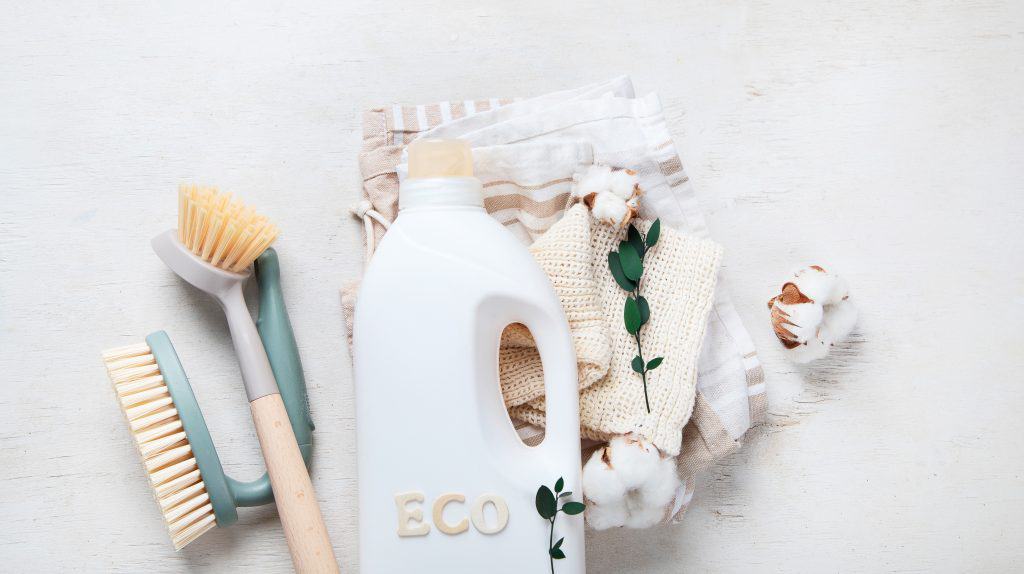
In This Article
Nowadays, it is important to incorporate sustainable practices in our day to day lives to contribute to the fight against climate change. As our planet faces ever-increasing environmental challenges, making conscious choices to minimize our ecological footprint is essential. Choosing eco-friendly products for your home is a great way to reduce your environmental impact and have a more sustainable lifestyle.
However, choosing a product that is truly eco-friendly so complicated. The lack of instant and reliable knowledge poses a problem to consumers, as it’s hard to know whether a product is actually designed with environmental concerns in mind or if a company is simply branding a product as such.
What are eco-friendly products?

Eco-friendly products are products designed to have a lower environmental impact throughout their entire life cycle. Companies are meant to address many details in the product´s entire life cycle in order for the product to be eco-friendly. They need to consider the raw materials used in their manufacturing, to their design, the transportation method to users, as well as its capacity to be recycled.
By selecting eco-friendly products, you encourage companies and businesses to adapt their practices and products to remain competitive while you:
- reduce the waste generated in your own home, as eco-friendly products are meant to be designed to have a minimal impact on the environment,
- reduce the emission of GHG, as eco-friendly products are generally produced with less carbon intensive processes,
- conserve resources, as eco-friendly products use less natural resources compared to other products
- eat healthier products, as eco-friendly products are often free from harsh chemicals, making them safer for your family and
- support sustainable businesses that are working towards a better future.
Choosing eco-friendly products for your home
Understanding and communicating the environmental impact of different products is essential to make them accessible and encourage people to use eco-friendly products. This becomes increasingly difficult with the amount and variety of products that people interact in our day to day lives. It is simply not feasible that individual people research every single product that they consume to determine the best alternative. However, with the expansion of Life Cycle Assessment (LCA) research in the past few decades, we have more information available to us that may be able to provide some key insights and general rules to follow when buying food.
A recent study published by a team of researchers at the University of Oxford were able to estimate the environmental impact of 57,000 products in the UK and Ireland. Researchers looked at 4 categories of potential problems: GHG emission, water use, land use and the potential for foods´ production to build up harmful levels of nutrients in aquatic ecosystems. Their finding suggest the following:
- Plant-based alternatives to meat may in some cases have one-fifth to less than one-tenth the impact of meat.
- Generally speaking, the products with less environmental impact are those made primarily from fruits, vegetables, sugar and flour.
- While meat and dairy products tend to generate a higher overall environmental impact, beef and lamb were 240% more impactful than pork, which was twice as bad as chicken and turkey, which were twice as impactful as vegan and vegetarian alternatives.
Taking these conclusions into consideration, you should consider incorporating some plant-based alternatives to meat in your diet or simply prioritize chicken and turkey, as they are the least damaging sources of meat. Besides, you should also incorporate more fruits and vegetables, as well as products made from fruits, vegetables, sugar and flour such as vegetarian soups and some types of cereals and bread.
Some additional considerations when selecting other eco-friendly products for your home are explored as follows:
- Look for third-party certifications: The best way to determine whether a product is eco-friendly is to rely on third-party certifications, such as the EPA´s ecolabel performance standard or the Cradle to Cradle international certification. Find products with certifications from reliable organizations that evaluate the environmental impact of each item. Generally, all these certification are displayed on the packaging of the product itself and usually depend on the country
- Go natural and biodegradable: Select products that are made from natural or biodegradable materials. For example, you can find products made from plant-based ingredients and come in recyclable or biodegradable packaging. This way, you can reduce the amount of waste that ends up stored in landfills or in our oceans for years.
- Find energy-efficient products: Energy-efficient products can help you save money on your energy bills and reduce your carbon footprint. Look for products with energy efficiency certifications such as the EPA´s ENERGY STAR label or products whose companies have energy management certification like ISO 50001.
- Avoid products with harmful chemicals: Many household products contain harmful chemicals that can be harmful to your health and the environment. Look for products that are free from harmful chemicals such as phthalates, parabens, and formaldehyde to substitute the ones you currently own.
- Consider local products: Supporting small businesses that locally produce handmade and eco-friendly options might be a viable option for a lot of people. Buying locally produced products reduce transportation GHG emissions compared to other alternatives. Furthermore, it is easier to learn about the quality control that products undergo and encourage companies to adopt more sustainable practices.
Keeping ourselves informed is the best solution
With how quickly science and technology is progressing today, our understanding of what makes products eco-friendly and where to find them also increases. This is why keeping ourselves informed and updated is important.
Choosing eco-friendly products for your home is a powerful way to make a positive impact on the environment. Remember that every small step counts, and by making conscious choices, you can make a big difference in the world.



